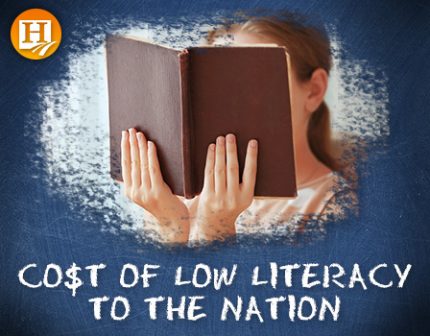Did you know that the U.S is the only country (out of 30) where the current generation is less educated than the previous generation? Literacy rates are down, and this fact has a huge impact on the nation as a whole. In spite of the government’s efforts to improve education, the statistics speak poorly of literacy rates. Aside from embarrassing the U.S., what are the effects of these low literacy rates on our nation? Which states are doing the worst? What can be done about this?
The Effects
Researchers estimate that low literacy costs the nation about $225 billion a year in crime, lowered workforce productivity, and loss of tax revenue associated with unemployment. It also accounts for another $232 billion a year in health care costs because people with low reading skills tend to have poorer health. This problem tends to multiply; children of parents with low literacy skills have a 72% chance of having poor reading skills themselves.
On an annual basis, high school dropouts account for 1 out of 6 students. Interestingly, nearly 75% of inmates report having dropped out of high school. Furthermore, nearly 50% of immigrants to the U.S lack the language speaking skills to be proficient in college and the workforce.
In addition, since literacy is a requirement in most job positions, sometimes job openings remain vacant as there is no one qualified to fill the position. Those who are illiterate also affect the ability of our nation to make important changes because those who cannot read cannot judge whether the political material they are reading, for example, has any meaning to them. Thus, ballots remain unsent. Those who are illiterate also tend to not participate in community or civic activities that could have the effect of bringing about great change in our communities.
Which States Have the Lowest Literacy Rates?
According to Forbes, while the nation as a whole is doing poorly, there are some states who remain at the bottom of the barrel, so to speak. These states – and their corresponding literacy rates – follow:
- Oklahoma – 31.86%
- Texas – 30.82%
- Tennessee – 28.38%
- Alabama – 26.01%
- Nevada – 24.93%
- Kentucky – 22.98%
- Arkansas – 19.06%
- Louisiana – 16.72%
- Mississippi – 14.46%
- West Virginia – 11.99%
Is There a Solution?
With literacy rates at a recent low, we’ve seen the devastating effects on our nation. But, are there any solutions? Can anything be done? Research shows that the following may impact the low literacy rates:
- Employer-sponsored basic training – Employers can invest time and money into obtaining basic literacy training for their employees. Training will help close the gaps that are created due to a lack of trained personnel. It will also help create competitive individuals who will then have literacy skills they can take with them anywhere.
- Support within schools – Recognizing the signs of illiteracy early on while individuals are still young is probably the best way to combat low literacy rates. While still in school, children can obtain the help they need to improve reading skills and higher-order thinking skills, thus producing literate adults.
- Outreach programs – Sadly, those who need help the most are receiving the least help. Those are also the communities who know the least about this need.To help, public and private outreach organizations must reach into those poorer, illiterate communities themselves and connect individuals with the support systems they require.
It is clear that low literacy rates don’t just affect the illiterate; they affect the entire nation. From higher instances of crime to increased poverty, low literacy rates create a sort of domino effect where each person affects another. There are things we can do to combat this with quality online literacy programs, but ultimately the solution starts at home.
Tasha Swearingen
Tasha is a homeschooling mom to 5 and has been homeschooling for 14 years. Currently, her children's ages span from toddler to young adult. Tasha has a Bachelor's of Science degree in Social Sciences from Florida State University and is working on her MBA through SNHU/Berklee School of Music.
Latest Posts

Guest Post by Gabriel Morse For several years, I sat for long hours every day behind one of those battleship gray desks in a windowless, dull, gray office. The pay was enough to take care…
Read more >
This post is sponsored by Little Monsters Universe. I'm Tina Salmanowitz, an advocate for homeschooling and science education. With over a decade of experience as a science educator (in class…
Read more >
This post is sponsored by Time4Learning. Before the pandemic, it was business as usual for Boca Raton resident Nikki Warris. Her two daughters, 5-year-old Natalie and 8-year-old Lexi were…
Read more >


